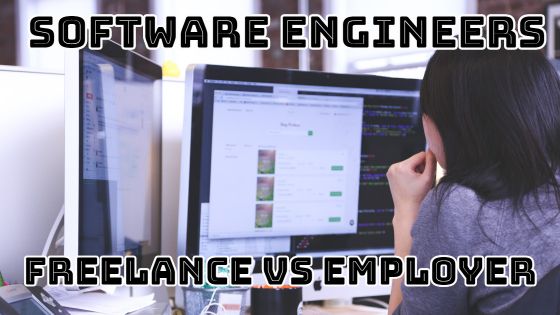Software Engineers: Freelance vs Employer
Software engineer is one of the best jobs on the market at the minute. There are so many opportunities available, many of them offering a good salary. You also have the option of going freelance and working from home, sourcing your own clients. There is a lot of debate about which is best, and a lot of myths surrounding the idea of being freelance. If you are trying to decide between a full-time position or going out on your own, here are a few of the major pros and cons on either side.

Payment
One of the major differences between freelance and full-time is payment. Obviously, if you are working for a company you’ll get paid a consistent amount every month. That makes it fairly easy to plan your finances. When you’re freelancing things will be a lot more uncertain. If you manage to find some longer term projects then you’ll have a more regular income. Unfortunately, most of the time you’ll be doing short-term projects which you’ll be getting paid different amounts for.
You’ll need to be aware of the dangers involved with freelancing. If projects are delayed for some reason then you might not end up getting paid as often as you had planned. It’s a good idea to keep some money aside in case.
Finding Work
One of the major hurdles for anybody that is freelancing is finding work. If you’re employed by a company, all of that is sorted for you. A large amount of your time will have to be spent pursuing clients and if you are already working on a project, this can mean working very long hours.
Less Support
As a freelancer, you will be doing everything alone. If you’re writing a piece of software and you are having trouble with it, there won’t be any other employees around that you can ask for help. Having that support network can be very useful in certain situations. However, there are ways around it so there’s no need to let it put you off too much. As long as you use JIRA test management to check that everything is functioning, you should be fine.
Flexibility
The main reason that people are attracted to freelancing is the flexibility. Choosing your own working hours, not answering to anybody, not having to get up early. Sounds good, right? It’s not quite that clear-cut, though. Having this level of flexibility can be dangerous and a lot of freelancers have trouble staying motivated when they first start out. Just because you’re working from home it doesn’t mean you can just sit around watching TV instead of working.
Benefits
Perhaps the biggest downside to working from home is the lack of benefits. If you are employed by a company then you’ll get paid holidays and sick days. There is also a chance that you’ll get health care benefits as well. Freelancers don’t get any of that. If you need some time off, that means losing out on money. On the other hand, it does mean that you are free to take time off when you like, so you should weigh up your priorities.
If you have any feedback about this article, do let us know and do not forget to subscribe to Tech2Blog.com by Email to get free alerts on your Inbox.




